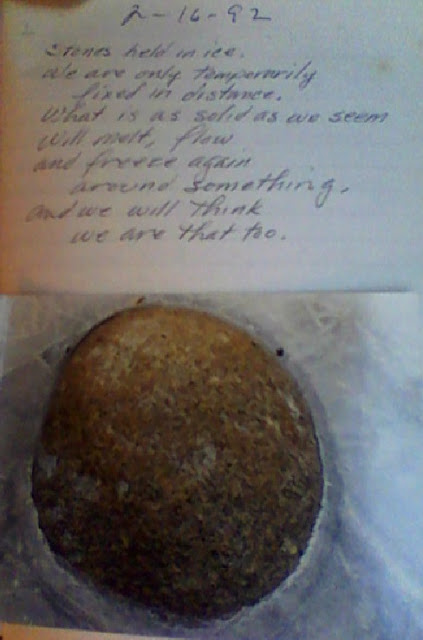One of my favorite poets is Masaoka Shiki (1867-1902). Here is a doodle of him in my current journal:
This poem, translated by San Francisco Poet, Kenneth Rexroth, with guidance from Morita Yasuyo and Kodama Sanhide, was included in the 1976 book,
One Hundred More Poems From The Japanese:
A little over 10 years later, we had a big winter and the Sierra snowline dropped to about 1600 feet above sea-level. We built two little sleds and the kids painted them blue. We packed them into the VW Bus and drove to the lower slopes. After sledding, we hiked into the trees and there it was. I took a photo and wish I could find it, but can't. It was a maple leaf embedded in the snow. I composed a poem in my mind and included it in a group of submissions to a magazine --it was not among those selected. I post it here:
Yes, I felt a jostle over a span of 100 years!
What is this all leading up to? I'm not sure, but along the way --entering the century's closing decade, we had two more cold winters --both of which caused creeks to freeze in this valley. I opened another journal and found this:
For those, like me, who have trouble deciphering my script, I will describe it as an ice-bound rock. The poem, as I recall, was an effort to use the tremendous operations of nature --the language of the universe-- as a metaphor.
William Blake opined, "To see a World in a Grain of Sand. And a Heaven in a Wild Flower." You see? Ampliative induction: A glimpse of immensity from a detail. He was a poet. So was Masaoka Shiki.
I am a gardener, but still I try. April is National Poetry Month.
You try too.




You reach a poetic moment whenever you see the whole of beauty in one small detail. Can life be any better?
ReplyDeleteThey are good moments, Emma. Thank you.
DeleteThere is exquisite poetry in the smallest things and a deceptively complex beauty. It reflects the enormity of the scheme of things - - and the fragility of ourselves.
ReplyDeleteLovely poems and a wonderful "doodle" of Masaoka Shiki.
Kind Jon, a little sumi painting kit is a gift from Daughter. Good for journals. I learn something every time I use it.
DeleteFrom a writing I found in years past, circa 69....
ReplyDelete"On a train to Osaka
You got's rhythm"
Thanks, Mike, and as the song says,"Who could ask for anything more?".
DeleteGeo, you see things in objects that only a poet's heart can.
ReplyDeleteDear Arleen, A most generous compliment. Thanks.
DeleteIndeed you try, and successfully. Discussing this blog or Gardening with Geo I refer to you as a poet. You have a poet's perspective and an expressive and imaginative way with words. We visit these environs with great appreciation.
ReplyDeleteWe all have that mechanism in us that distills reality, Tom, without which we wouldn't recognize ourselves.
DeleteYou are a gardener AND a poet, Geo.
ReplyDeleteI love all of these poems, and the metaphor within your second one.
If I see a maple leaf frozen in snow or ice, the jostle will be there in my mind too. And I will try to take a photo. Too late this winter (I think) but, never fear, this is the kind of thing that sticks in my mind, while what I needed at the grocery store falls completely out.
The leaf will be there, Jenny, has always been there. The connection can't be unmade.
DeleteSomething in me
ReplyDeleteLeaps further inward.
I meet you there.
Delightful Suze, I'm pleased to encounter you anywhere.
DeleteJolly good.
DeleteI am a little afraid of poetry; not reading it but trying to write it. And I'm in awe of people who write poetry. That said, there is poetry all around us, and poets can capture that with precise words and powerful images that slam us. William Blake is one of my favorites, and you remind me that I should spend more time reading poets. Poets have an ability to express complex thoughts in spare words.
ReplyDeleteI took a course in philosophy once (a full year's course), and although I managed a B in the course, I was more or less lost. I found my niche in geology, and though I don't recall ever hearing the term "ampliative Induction," I was constantly practicing it in geology. Of course, I had to google the term, but that's one of the things I enjoy about your blogs ~ you push my mind into areas I typically don't go.
I think gardeners are amazing people because they create poetry in their personal landscapes. And some also create poetry with words and art!
I would argue that Norma creates poetry with light.
I have a broad personal definition of poetry, as you can see.
And the naturalist in me came to a full stop when I read Masaoka Shiki's brief poem on the maple leaf. In seven short words he lasers our focus on something so small and simple, yet profoundly lovely. Thank you for introducing him to me!
Thank YOU, for reading my essay. So glad you like Masaoka Shiki. He was always sending his thoughts across voids --time, distance, outer space and human feelings. Your comment got me reopening the Rexroth book for 2 examples of Shiki's skill. He could fascinate:
Delete"Fresh from the Void
The moon
On the waves of the sea."
He could get silly:
"Shitting in the winter turnip field
The distant lights of the city."
And if, on a "spring night A flute player Passes by. " in your dreams or imagination, it is probably Shiki.